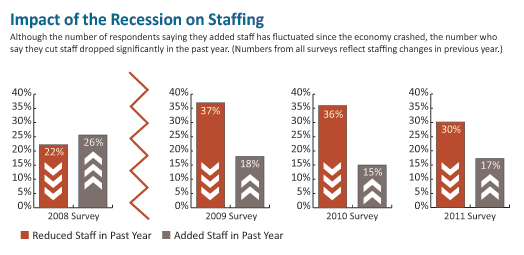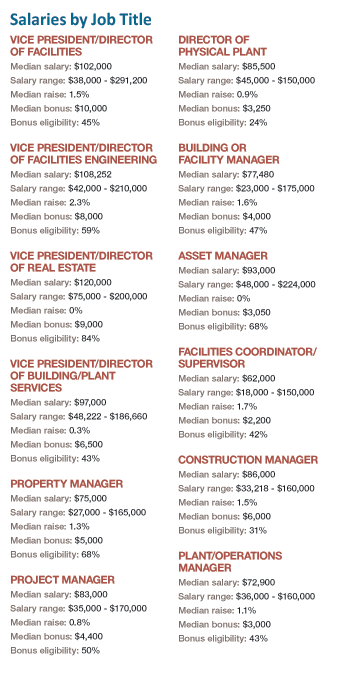Survey: Facility Managers Had to Take Hard Look at Spending
The recession has led companies to demand that facility managers take a very hard look at expenditures. That's been the case at the law firm Fenwick & West. The last two years have been very successful, and Julie O'Loughlin, senior director of operations and facilities, says that was a direct result of "cutting out the fat and focusing in." Nonetheless, when the recession hit three years ago, there were some layoffs (less than 1 percent of staff). "We looked to eliminating unnecessary budget items throughout the organization," O'Loughlin says.
O'Loughlin says that the recession has permanently changed the way FM operates. "With regard to project approval, the tech bubble and the recession are cautionary tales," she says. "We are much more careful about the way we evaluate growth projects and spending in general." O'Loughlin says that as she talks to her peers in Silicon Valley, there is agreement that each project must be more thoroughly researched. Fenwick & West is just now beginning a $6 million expansion of a conference center, a project that was actually approved a year ago, because the firm took more time doing its homework. "We are pushing the limits in sustainability, quality and aesthetics," she says. Putting more time in on the front end, looking for "multiple wins" and looking toward the future and not just the fulfillment of immediate goals, have all been the result of the recession.
Morgan expects there will be no going back from the new normal. "Companies aren't going to open their checkbooks again. [They will be] working more in a performance-based rather than a prescriptive-based world," Morgan says.
For example, the traditional janitorial contract, where "one size fits all" and companies pay per square foot, will no longer suffice. Rather, contracts are now based on performance and requirements of individual locations and facilities, where the difference between cleaning the executive suite and the loading dock is taken into consideration.
The FM team must make the most effective use of resources, which can mean renegotiating contracts. "Suppliers have to be part of the process, especially for long-term relationships," says Morgan. "There's rigorous negotiation on supplies and external staff support to give us a great rate for an extended period of time and to lock that in." Vendors have also felt the effects of the recession and are granting suppliers longer contracts with less frequent bumps on pricing. This is somewhat advantageous to vendors, says Morgan, since long-term relationships create income stability.
One lesson from the recession is the need to evaluate the impact of cost-cutting measures. Budget cuts sometimes lead companies to sacrifice energy efficiency as a way of reducing first costs. That hasn't been the case at SAP. When equipment must be purchased, efficiency is a priority. "A seven-year return on investment is the break point," Morgan says. "Sustainability and energy efficiency are two of our sacred cows." However, less time and effort is being spent on replacing chairs, tables and carpet. "We are repurposing and extending the life of fixtures and finishes — carpet, wallpaper, light fixtures," he says.
When it comes to cutting costs, potential savings should be carefully targeted. "It's important to maintain the same level of service and maintenance without spending the same money, and we have been successful at that," says O'Loughlin. For example, an expensive summer picnic was replaced with monthly events that highlight diversity — such as Martin Luther King Jr. Day or Cinco de Mayo. Friday "Beer is Here" events sponsored on a rotating basis by various departments have also increased employee cohesion at a much lower cost. These events are like "pot lucks," where department members provide beverages as well as hors d'oeuvres.

Click to download PDF

Click to download PDF
Related Topics:
















